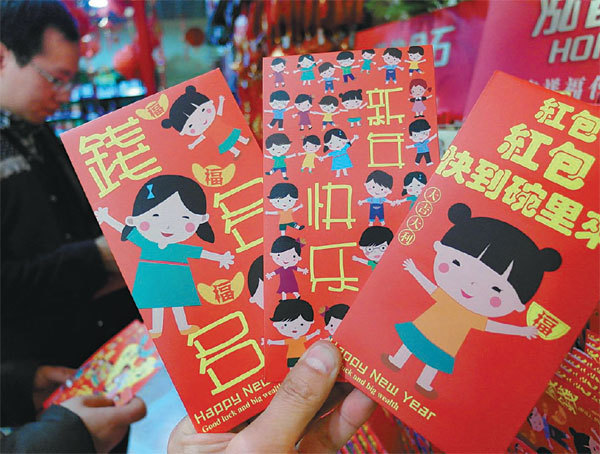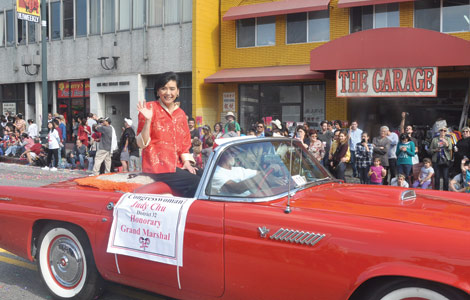A small present with a big meaning
Updated: 2015-02-24 07:45
By Zheng Caixong in Guangzhou(China Daily)
|
||||||||
|
Hongbao, or red envelopes, are very popular during Spring Festival. Liu Junfeng / For China Daily |
Giving hongbao, or red evenlopes, is the prefect gift for Spring Festival
Hongbao, a red envelope containing small amounts of money, is a gift that is guaranteed to be warmly received, not just because of the cash, often a token amount, but also because of its traditional symbolism and best wishes for the future. This is true throughout China, but especially in the south where people regard receiving hongbao as an auspicious beginning to the New Year.
Legend in the south has it that a devil used to appear to harm children and the elderly but loud noise would frighten the devil away, as did the color red.
Firecrackers took care of the noise and during Spring Festival couplets containing verse or prose also helped keep him at bay.
But firecrackers, by definition, might annoy more than the devil and they couldn't go off all day so children and the elderly also got hongbao, red envelopes containing money.
The tradition has survived millennia and giving hongbao to children and the elderly remains popular among Chinese people all over the world. It has also made its way into workplaces where bosses often give employees hongbao and most recently, companies have adopted online marketing strategies where hongbao are distributed.
The practice is so prevalent in Guangdong and its bordering Hong Kong and Macao special administrative regions that you run the risk of being seen as rude if you don't have some hongbao to give as gifts during the Spring Festival.
"Children and the elderly who are given hongbao during the New Year are not only given gifts, but also the best wishes from their parents or children for the coming year," said Zeng Yingfeng, chairwoman of the Guangzhou Association of Folk Arts.
Zeng remembers her delight when she was a child and was given hongbao by her parents and senior relatives even though the hongbao contained less than 10 fen. A yuan ($0.16) has 100 fen.
The amount of cash contained is usually a token gesture, Zeng added.
Liu Xiaochun, a professor from the school of humanities with Guangzhou-based Sun Yatsen University, said giving hongbao to children during the New Year shows that adults are expressing their best hopes for the children's future.
"Many business bosses also give hongbao to their employees when they start work after the New Year, hoping their companies and staff members have a good start," Liu told China Daily.
"The hongbao may not contain much money, but it indicates the bosses', or the companies' care for their staff members," he said.
Liu said he did not think the traditional custom would be affected by the current anti-corruption campaign and relevant regulations and rules issued by the central government to ban Party and government officials from accepting hongbao during the New Year.
"Giving hongbao at the beginning of the Lunar New Year indicates best wishes for the future," he said.
"People will continue to give hongbao to children of friends and relatives this year."
Chen Fangcheng, a civil servant in Guangzhou, said she will continue to give hongbao to the children of her colleagues and friends, as she did in previous years.
Wu Yuyu contributed to this story.
zhengcaixiong@chinadaily.com.cn
Most Viewed
Editor's Picks

|

|

|

|

|

|
Today's Top News
US State Dept calls for cyber security boost
Anbang buys new piece of Manhattan
California here we come: Chinese
Port dispute over, shelves take time to restock
School, firm to link up in cancer fight
Killer of 'American Sniper' Kyle jailed for life
Alaska quietly becomes 3rd US state to legalize marijuana
Highly skilled immigrant spouses can soon work in US
US Weekly

|

|

















